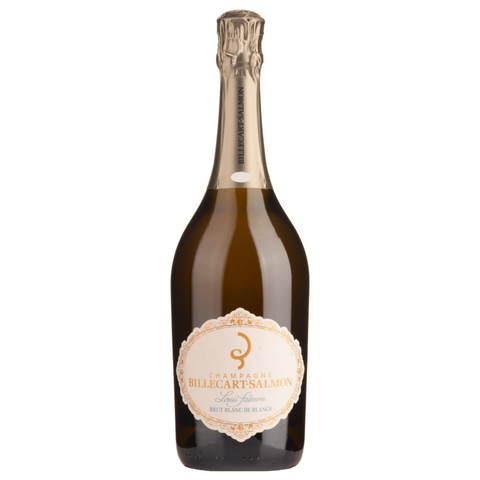
2012 Billecart-Salmon "Cuvée Louis Salmon" Blanc de Blancs, Brut, Champagne, France
Distinguished elegance of a mineral and exceptionally precise Chardonnay with a natural balance that is a harmonious representation of the best parcels of grand crus of Côte des Blancs: Cramant, Chouilly for the finesse, Avize for the force of character and Mesnil-sur-Oger for the structure and longevity.
ABOUT THIS WINE
This cuvée was named in tribute to Louis, Elisabeth Salmon’s brother, who was passionate about oenology and highly involved in winemaking from the earliest creation of the House. Originating from the best parcels of the Côte des Blancs, the Blanc de Blancs vintage is endowed with purity and minerality.
100% Chardonnay grands crus of Côte des Blancs: 60% Mesnil-sur-Oger, 23% Cramant, 11% Chouilly et 6% Oiry.
25% vinified in oak casks
Ageing on lees: 9 years, 7 months
Dosage: 3.9g/l
ABOUT THIS PRODUCER:
The Billecart family has been living in Mareuil-sur-Ay since the 16th century. When Nicolas Francois Billecart married Elisabeth Salmon in the early 1800s the two families' long held vineyards were married as well. This led to Nicolas' decision to leave his law practice and take over the family wine estate. In 1818 he founded the house of Billecart-Salmon which now stands as the oldest continuously family owned and operated house in Champagne. It is currently managed by the seventh generation, brothers Francois and Antoine Roland-Billecart. The cellars are in the hands of renowned "chef de cave" Francois Domi.
Billecart-Salmon owns a total of 15 hectares of vineyards. Eleven of these are in the Vallee de la Marne split between 4ha of Grand Cru in Ay and Premier Cru in Mareuil-sur-Ay and 7ha in the village of Damery. In the Cote des Blancs the family owns 4ha of Grand Cru vineyards in the villages of Chouilly, Avize and Le Mesnil-sur-Oger. With respect to harvest one of the most distinctive aspects of Billecart-Salmon is their philosophy that an early harvest yields more elegant and delicate champagnes. They look for a strong acid structure rather than alcohol as a preservative and therefore, never harvest at higher than 10 degrees of potential alcohol.
Another defining characteristic of Billecart-Salmon is their practice of double cold settling which they began in 1952. This involves a primary cold settling of the pressed juice for a period of 12 hours whereby the heaviest of the must solids fall to the bottom. The juice is then racked into clean tanks where it is chilled down to 2C for another 48 hours. This second and much colder settling eliminates any wild yeasts and additional heavy elements without the use of enzymes, filtering or a centrifuge. After the second racking, fermentation is initiated by adding dried yeasts and maintained at a long slow pace for up to 5 weeks in order to preserve as many delicate fruit aromas as possible. One varietal that benefits greatly from this is Pinot Meunier which the Billecarts believe is a vital component in world class champagnes. Many producers shy away from Meunier because it is easy to burn off its delicate aromas during fermentation. Malolactic fermentation is allowed to occur but may be blocked in certain years if the vintage conditions warrant it. Since 1987 the family has been making a certain percentage of the wines for their vintage cuvee champagnes in barrel. In these instances malolactic fermentation is always blocked.
As of 2001, Billecart-Salmon moved their winemaking into a brand new facility that they believe to be the most technically advanced in Champagne. The intricate and precise nature of Francois Domi's winemaking demanded that the family use every available resource to create the perfect environment for the production of these truly stellar champagnes. The ability to perform as many as 75 micro-fermentations simultaneously allows M. Domi the luxury of keeping many of his parcels separate until the blending phase. Overall, production levels are modest and many of Billecart-Salmon's prestige cuvees are highly allocated.
Details:
| Grape(s) | Chardonnay |
| Farming | Sustainable |
